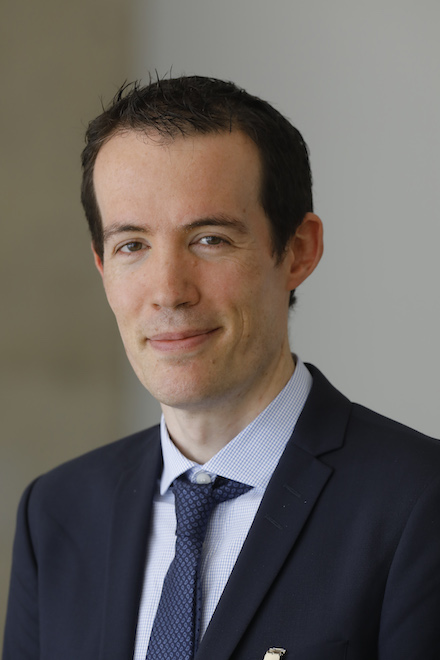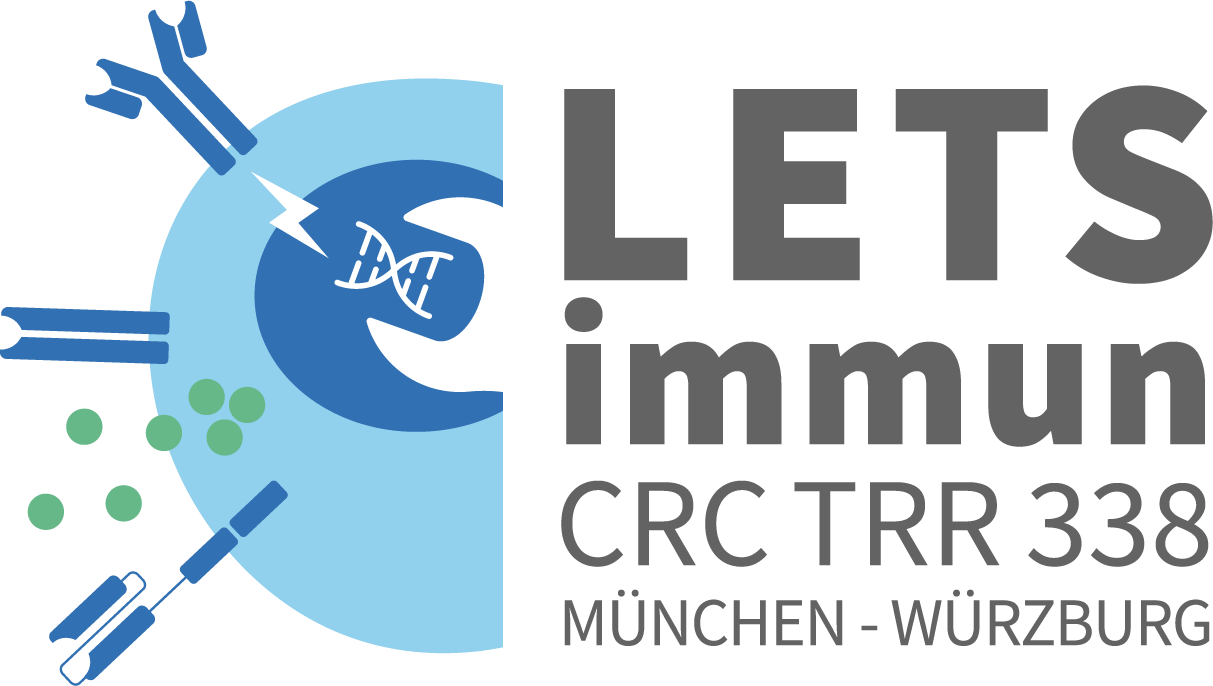
Prof. Dr. med. Sebastian Kobold
Abteilung für Klinische Pharmakologie
Klinikum der Ludwig-Maximilians-Universität München
Lindwurmstraße 2a
80337 München
Phone: +49 89 4400 57325
Email: sebastian.kobold@med.uni-muenchen.de
University training and degree
2008 – 2016 Residency training in internal medicine with a focus on hematology and oncology, as well as in immunology and clinical pharmacology (Hamburg, Munich, Boston).
2004 – 2006 Doctoral thesis, University hospital of Zurich, defended in 2010
2001 – 2007 Medical studies, completed with medical degree and german practice license
Advanced academic qualifications
Habilitation Experimental internal medicine, Ludwig-Maximilians-Universität München, 2014, mentor S. Endres, W. Zimmermann and R. Henschler
Doctorate Serological identification of pancreatic cancer patients, Universität des Saarlandes, 2010, C. Renner and A. Knuth
2014 Board certification in clinical pharmacology (Bavarian chamber of physician)
2014 Board certification in immunology (German Society for Immunology)
Postgraduate professional career
Since 07/2019 W2-professor for experimental immunooncology and deputy director, division of clinical pharmacology, Munich, Germany.
2016 – today Attending physician, division of clinical pharmacology, Munich, Germany
2014 – today Head, immunopharmacology group, division of clinical pharmacology, Munich, Germany
2013 Visiting scientist, laboratory of Kai Wucherpfennig, Dana-Farber Cancer Institute, Boston, USA
2011 – 2013 Deputy head, immunopharmacology group, division of clinical pharmacology, Munich, Germany
2009 – 2011 Postdoctoral fellow, division of clinical pharmacology, group of Carole Bourquin (Munich, Germany)
2008 – 2009 Postdoctoral fellow, department of oncology and hematology, laboratory of Djordje Atanackovic (Hamburg, Germany)
Editorial positions
2018 – today Associate editor, Journal for the Immunotherapy of Cancer (JIF: 10)
Scientific Advisory Boards
2019 – today Various scientific advisory boards for Novartis Germany and USA
2017 – today Associated member of the scientific advisory board of TCR2 Inc, Boston, USA
2016 Member of the scientific advisory board of Celyad, SA, Belgium
Honors (selected):
2020 Clinical Science Award by the German Society for Immunotherapy
2019 M4-preseed Award by the Bavarian Ministry of Economical Affairs
2019 Johann-Georg-Zimmermann Award for Cancer Research
2017 European Research Council (ERC) Starting Grant
2017 Hugo-Wilhelm- von Ziemsen Award for medical research, awarded by the Department of Internal Medicine IV, Klinikum der Universität München
2016 Vincenz-Czerny Award for cancer research, awarded by the German Society of Hematology and Oncology
2016 BMS-MRA Young Investigator Award, awarded by the Melanoma Research Alliance, Washington D.C., US
2016 Ernst-Jung Karriereförderpreis 2016, awarded by the Ernst-Jung-Stiftung
a) Articles published by outlets with scientific quality assurance, book publications and works accepted for publication, but not yet published
1. Ataide MA, Komander K, Knöpper K, Peters AE, Wu H, Eickhoff S, Gogishvili T, Weber J, Grafen A, Kallies A, Garbi N, Einsele H, Hudecek M, Gasteiger G, Hölzel M , Vaeth M and Kastenmuller W. BATF3 programs CD8 T cell memory. Nat Immunol. 2020 Nov;21(11):1397-1407.
2. Welz M, Eickhoff S, Abdullah Z, Trebicka J, Gartlan KH, Spicer JA, Demetris AJ, Akhlaghi H, Anton M, Manske K, Zehn D, Nieswandt B, Kurts C, Trapani JA, Knolle P, Wohlleber D, Kastenmuller W. Perforin inhibition protects from lethal endothelial damage during fulminant viral hepatitis. Nat Commun. 2018 Nov 15;9(1):4805.
3. Brewitz A, Eickhoff S, Dähling S, Quast T, Bedoui S, Kroczek RA, Kurts C, Garbi N, Barchet W, Iannacone M, Klauschen F, Kolanus W, Kaisho T, Colonna M, Germain RN and Kastenmuller W. CD8+ T cells orchestrate pDC – XCR1+ dendritic cell spatial and functional cooperativity to optimize priming. Immunity 2017 Feb 21;46(2):205-219
4. Eickhoff S, Brewitz A, Gerner MY, Klauschen F, Komander K, Hemmi H, Garbi N, Kaisho T, Germain RN, Kastenmuller W. 2015. Robust Anti-viral Immunity Requires Multiple Distinct T Cell-Dendritic Cell Interactions. Cell 2015 Sep 10;162(6):1322-37.
5. Franklin BS, Bossaller L, De Nardo D, Ratter JM, Stutz A, Engels G, Brenker C, Nordhoff M, Mirandola SR, Al-Amoudi A, Mangan MS, Zimmer S, Monks BG, Fricke M, Schmidt RE, Espevik T, Jones B, Jarnicki AG, Hansbro PM, Busto P, Marshak-Rothstein A, Hornemann S, Aguzzi A, Kastenmuller W, Latz E. 2014. The adaptor ASC has extracellular and ‘prionoid’ activities that propagate inflammation. Nat Immunol 15: 727-37
6. Bald T, Quast T, Landsberg J, Rogava M, Glodde N, Lopez-Ramos D, Kohlmeyer J, Riesenberg S, van den Boorn-Konijnenberg D, Homig-Holzel C, Reuten R, Schadow B, Weighardt H, Wenzel D, Helfrich I, Schadendorf D, Bloch W, Bianchi ME, Lugassy C, Barnhill RL, Koch M, Fleischmann BK, Forster I, Kastenmuller W, Kolanus W, Holzel M, Gaffal E, Tuting T. 2014. Ultraviolet-radiation-induced inflammation promotes angiotropism and metastasis in melanoma. Nature 507: 109-13
7. Lammermann T, Afonso PV, Angermann BR, Wang JM, Kastenmuller W, Parent CA, Germain RN. 2013. Neutrophil swarms require LTB4 and integrins at sites of cell death in vivo. Nature 498: 371-5
8. Kastenmuller W, Brandes M, Wang Z, Herz J, Egen JG, Germain RN. 2013. Peripheral prepositioning and local CXCL9 chemokine-mediated guidance orchestrate rapid memory CD8+ T cell responses in the lymph node. Immunity 38: 502-13
9. Kastenmuller W, Torabi-Parizi P, Subramanian N, Lammermann T, Germain RN. 2012. A spatially-organized multicellular innate immune response in lymph nodes limits systemic pathogen spread. Cell 150: 1235-48
10. Gerner MY, Kastenmuller W, Ifrim I, Kabat J, Germain RN. 2012. Histo-cytometry: a method for highly multiplex quantitative tissue imaging analysis applied to dendritic cell subset microanatomy in lymph nodes. Immunity 37: 364-76
